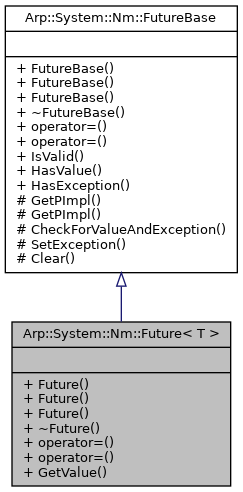Future object as proxy for return value an asynchronous function call More...
#include <Future.hpp>
Inheritance diagram for Arp::System::Nm::Future< T >:

Public Member Functions | |
| Future ()=default | |
| Constructs an invalid Future More... | |
| Future (const Future &other)=default | |
| Future (Future &&other) noexcept=default | |
| Future & | operator= (const Future &other)=default |
| Future & | operator= (Future &&other) noexcept=default |
| T | GetValue () const |
| Returns the value set by the associated Promise More... | |
 Public Member Functions inherited from Arp::System::Nm::FutureBase Public Member Functions inherited from Arp::System::Nm::FutureBase | |
| FutureBase (const FutureBase &other)=default | |
| FutureBase (FutureBase &&other) noexcept=default | |
| FutureBase & | operator= (const FutureBase &other)=default |
| FutureBase & | operator= (FutureBase &&other) noexcept=default |
| bool | IsValid () const |
| Returns true, if this Future has an assiciated Promise | |
| bool | HasValue () const |
| Returns true, if a value or an exception has been set | |
| bool | HasException () const |
| Returns true, if an exception has been set | |
Additional Inherited Members | |
 Protected Member Functions inherited from Arp::System::Nm::FutureBase Protected Member Functions inherited from Arp::System::Nm::FutureBase | |
| virtual ImplBase & | GetPImpl ()=0 |
| virtual const ImplBase & | GetPImpl () const =0 |
| void | CheckForValueAndException () const |
| void | SetException (std::exception_ptr e) |
| void | Clear (bool isValid) |
Detailed Description
template<typename T>
class Arp::System::Nm::Future< T >
class Arp::System::Nm::Future< T >
Future object as proxy for return value an asynchronous function call
Constructor & Destructor Documentation
◆ Future()
template<typename T >
|
default |
Constructs an invalid Future
The default constructor is intended for Futures to be used as class members. Using copy or move constructors or assignments a class member can linked with a Promise.
Member Function Documentation
◆ GetValue()
template<typename T >
| T Arp::System::Nm::Future< T >::GetValue | ( | void | ) | const |
Returns the value set by the associated Promise
This function may throws an exception if not value has been set. Use HasValue() to check it. If an exception was set by the Promise the exception is rethrown here.
The documentation for this class was generated from the following file:
- Arp/System/Nm/Future.hpp